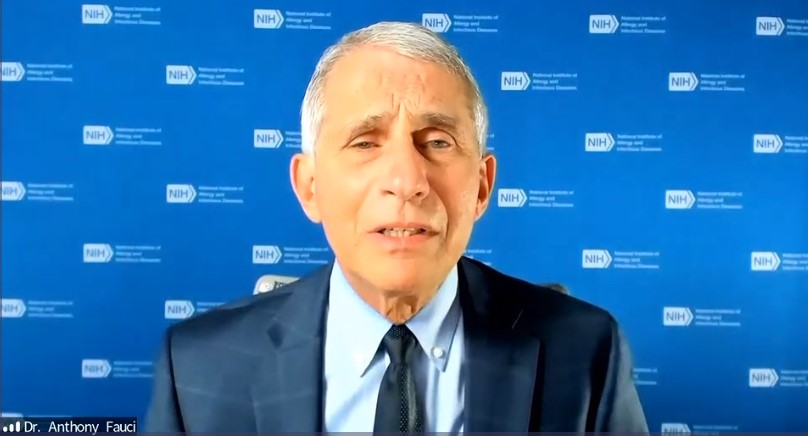Fauci Joins Infectious Diseases Experts for Candid Reflections on COVID-19
Of the many lessons learned during the COVID-19 pandemic, infectious diseases experts from the Brigham and beyond say one takeaway rises to the top: the need to stay humble.
“What’s been remarkable is how much has changed, how much has been assumed and then rapidly overturned. We all need to appreciate that the things we think are true today might not be true tomorrow,” said Michael Klompas, MD, infectious diseases expert and hospital epidemiologist, during a virtual panel discussion on COVID-19. “I think that’s the lesson to apply to the inevitable next pandemic we face — to go in there not with certainty but with humility.”

Anthony Fauci discusses lessons learned and ongoing challenges around COVID-19 during a special HMS Medical Grand Rounds.
That earned a hearty agreement from the nation’s leading infectious diseases expert, Anthony S. Fauci, MD, director of the National Institute of Allergy and Infectious Diseases, who joined Harvard Medical School’s special Medical Grand Rounds event as a distinguished guest lecturer on Sept. 10.
When panelists were asked to reflect on what COVID-19 has taught them, Fauci responded that “humility really permeates” several of the important lessons he’s learned in leading the country’s pandemic response.
“When you’re experiencing an outbreak, don’t ever, ever underestimate the potential of the pandemic,” Fauci said. “We’ve been through this before — remember HIV. Five gay men, then 26 gay men, then it’s ‘only a gay man’s disease’ … and then fast-forward a few decades, you have 78 million people who have been infected and 30-plus million have died. Don’t ever try to underestimate as it evolves, and don’t try to look at the rosy side of things.”
Fauci opened the hour-long webcast with a wide-ranging presentation on what we do (and still don’t) know about COVID-19 and the virus that causes the disease, continued health equity concerns, how the U.S. is trending in infections, promising vaccine trials underway and the logistical challenges of distributing a vaccine nationwide.
Compared to countries in western Europe, the U.S. still has an “extraordinarily unacceptable baseline” of new cases per day, Fauci said. Continued surges in states that have been more aggressive in “reopening” society have caused the country to lose some of the gains made during the summer months, he added.
“I don’t talk about second surges because we’re still in the first surge. It isn’t as if we went way down,” Fauci said. “As we try to open up — and if we don’t do it correctly — we’re going to see these surges that we’ve seen the Southern states and the Midwest.”
Despite the uncertain outlook, Fauci said there’s still cause for optimism. He pointed to a number of studies that have advanced science’s understanding of the coronavirus, as well as the clinical trials for vaccine candidates currently underway — pausing to recognize the Brigham’s Lindsey Baden, MD, for his leadership in a nationwide trial of a vaccine candidate currently under investigation.
“Boston is playing a major role in the kind of effort that we’re talking about, particularly in vaccines but also in other areas,” Fauci said. “We project that by the end of this calendar year — let’s say by November, December — we will know whether there’s a safe and effective vaccine, and I would say vaccines, plural. I’m cautiously optimistic that we will, based on encouraging Phase 1 and animal data. But with vaccines, you never say never, and you never say always.”
Following Fauci’s presentation, he participated in a question-and-answer session with Klompas and other panelists, including Rochelle Walensky, MD, MPH, chief of the Division of Infectious Diseases at Massachusetts General Hospital (MGH), and Sharon Wright, MD, MPH, senior medical director of Infection Control and hospital epidemiologist at Beth Israel Deaconess Medical Center. The discussion was moderated by Katrina Armstrong, MD, MSCE, physician-in-chief and chair of the Department of Medicine at MGH.
The Brigham’s Joel T. Katz, MD, director of the Internal Medicine Residency Program, delivered the event’s welcome address and speaker introductions.
View a recording of the webcast.

Leave a Reply